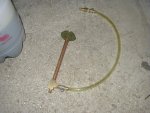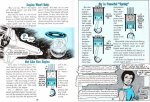I kind of figured I'd run into a few like you guys on a site like this.
compression braking has nothing to do with vacuum. LOL it's using the compression of the engine, you know when you quit adding fuel it's still making compression on all 6. Hills sure your out of luck, 15,000 - 20,000 LBS and your going right down a hill. LOL the compression won't do anything, and no it's not going to "speed it up"... how in the hell does adding more friction and compression without fuel going to "speed" up. Come on guys pulling one's leg and sounding like a jerk at the same time... well that's just funny to me.
Now, let's see your jumping my case here, I had brakes go out in my backyard. Doing 1/2 mile an hour. You said you had brakes go out say what? TWICE? ON ROAD? Who's not looking at things? LOL It seems to me if your having your brakes go out then you might wanna start looking into who's working on the machine. On road i've never lost brakes. However with loads and what not in my excursion engine braking works great. Don't know if you have ever been to Houston, but we don't have anything that even remotely looks like a hill. On our flat ground engine braking has worked quite well in my M109A3. Maybe you guys should have your engines looked at? Because mine will engine brake very well. However that's with no load in the truck just it's 15,000 lbs. But my engine is rebuild with 1000 miles on it. Once i get the brakes working, I'll record a video for you to show engine braking works just fine. No it does not stop you on a dime...
Now i will say you guys are right on the parking brake. It's a joke. You could make it work right but it's not going to stop the truck like normal brakes, your right about that.
Recovry4x4, thanks for the info. Thanks for pointing me to the pages so i can get started fixing this thing. David Doyle here seems to be on a one track mind of "setting" me straight.
Considered me straight buddy. I already have one daddy figure in my life...

Let's try and fix issues and help others that run into the same issues clear up these kind of problems.Sorry if i struck a nerve.
nuff' said.
Now here's what I'm trying to do. Fix the dang brakes correctly. However I'm not gonna run all over the place, I'd like to take it step by step.
Currently
Brakes worked 100% just a few months ago. Checked them the other day and no brakes.
Today - The MC was bone dry. Nothing I can see around the MC looks wet with fluid. I had the top off with the truck running and pumped the brakes and i could see a little fluid movement every now and then. With it all buttoned up still no brakes, checked the MC again no fluid loss. Air pressure is just fine without any leaks.
Tomorrow, I'll get under it and look for more leaks. I'll check the MC after overnight sitting... Can you guys give me the order of which to check for leaks? MC, lines, etc? I know you guys know this far better than I and figured if your all gonna be my daddy well let's get to it.

FYI there is no feeling in the peddle. To the floor and it will spring back up.
Take care guys.
Brian





